I have a QMainWindow, inside there is a QMenu, QLineEdit, and one QPushButton.
Every time I click the button, it plays a sound and then adds a text to the QLineEdit. In my QMenu the user must be able to choose which sound plays by checking it.

I tried to achieve this by changing a variable self.s inside the MainWindow class every time a QAction is checked, meanwhile, the other QAction's are unchecked. So in my playsound() I just put the self.view.s as the argument.
But it seems that it's only reading the original self.view.s, which is the first sound. My signals to change self.view.s does not work. Also, the other QActions aren't unchecked as I wanted them to.
Below is my code:
import sys
from functools import partial
from playsound import playsound
from threading import Thread
from PyQt6.QtCore import *
from PyQt6.QtGui import *
from PyQt6.QtWidgets import *
class MainWindow(QMainWindow):
def __init__(self):
super().__init__()
self.buttons = {}
self.setWindowTitle("Try")
central_widget = QWidget()
self.setCentralWidget(central_widget)
self.lay = QVBoxLayout(central_widget)
self.lineedit()
button = {"HEY! ": (0, 0, 0, 0)}
page = QWidget()
layout = QGridLayout(page)
for btnText, pos in button.items():
self.buttons[btnText] = QPushButton(btnText)
layout.addWidget(self.buttons[btnText], *pos)
self.lay.addWidget(page)
self.music()
def music(self):
self.s = 'sound1.mp3'
self.x = 'sound1.mp3'
self.y = 'sound2.mp3'
self.z = 'disable.mp3'
def lineedit(self):
self.le = QLineEdit()
self.le.setFixedHeight(35)
self.lay.addWidget(self.le)
def set_lineedit(self, text):
self.le.setText(text)
self.le.setFocus()
def line(self):
return self.le.text()
class Menu:
def __init__(self, MainWindow):
super().__init__()
self.view = MainWindow
self.menuBar()
#self.actionSignals()
def menuBar(self):
self.menuBar = QMenuBar()
self.view.setMenuBar(self.menuBar)
self.menu = QMenu(self.menuBar)
self.menu.setTitle('Menu')
self.sounds = QMenu(self.menu)
self.sounds.setTitle('Select Sound')
self.sound1 = QAction(self.menuBar)
self.sound2 = QAction(self.menuBar)
self.disable = QAction(self.menuBar)
self.mute = QAction(self.menuBar)
self.mute.setText('Mute Background')
self.mute.setCheckable(True)
self.mute.setChecked(False)
self.sound1.setText('Sound 1')
self.sound1.setCheckable(True)
self.sound1.setChecked(True)
self.sound2.setText('Sound 2')
self.sound2.setCheckable(True)
self.sound2.setChecked(False)
self.disable.setText('Disable Sound')
self.disable.setCheckable(True)
self.disable.setChecked(False)
self.sounds.addAction(self.sound1)
self.sounds.addAction(self.sound2)
self.sounds.addAction(self.disable)
self.menuBar.addAction(self.menu.menuAction())
self.menu.addAction(self.mute)
self.menu.addAction(self.sounds.menuAction())
def menu_signals(self):
self.sound1.triggered.connect(self.sound_1)
self.sound2.triggered.connect(self.sound_2)
self.disable.triggered.connect(self.disabled)
def sound_1(self, checked):
if checked:
self.sound2.setChecked(False)
self.disable.setChecked(False)
self.view.s = self.view.x
else:
self.sound1.setChecked(True)
def sound_2(self, checked):
if checked:
self.sound1.setChecked(False)
self.disable.setChecked(False)
self.view.s = self.view.y
else:
self.sound2.setChecked(True)
def disabled(self, checked):
if checked:
self.sound2.setChecked(False)
self.sound1.setChecked(False)
self.view.s = self.view.z
else:
self.sound1.setChecked(True)
class Controller:
def __init__(self, MainWindow):
self.view = MainWindow
self.connectSignals()
def background(self):
while True:
playsound('background.mp3')
def playsound(self):
playsound(self.view.s, False)
def buildExpression(self, sub_exp):
expression = self.view.line() + sub_exp
self.view.set_lineedit(expression)
def connectSignals(self):
for btnText, btn in self.view.buttons.items():
self.view.buttons[btnText].clicked.connect(self.playsound)
self.view.buttons[btnText].clicked.connect(partial(self.buildExpression, btnText))
app = QApplication(sys.argv)
w = MainWindow()
x = Controller(w)
Thread(target = x.background, daemon = True).start()
m = Menu(w)
w.show()
app.exec()
I want to be able to change the value within playsound() depending on which QAction is checked in the Menu Bar. While one QAction is checked, the other QAction's should be unchecked.